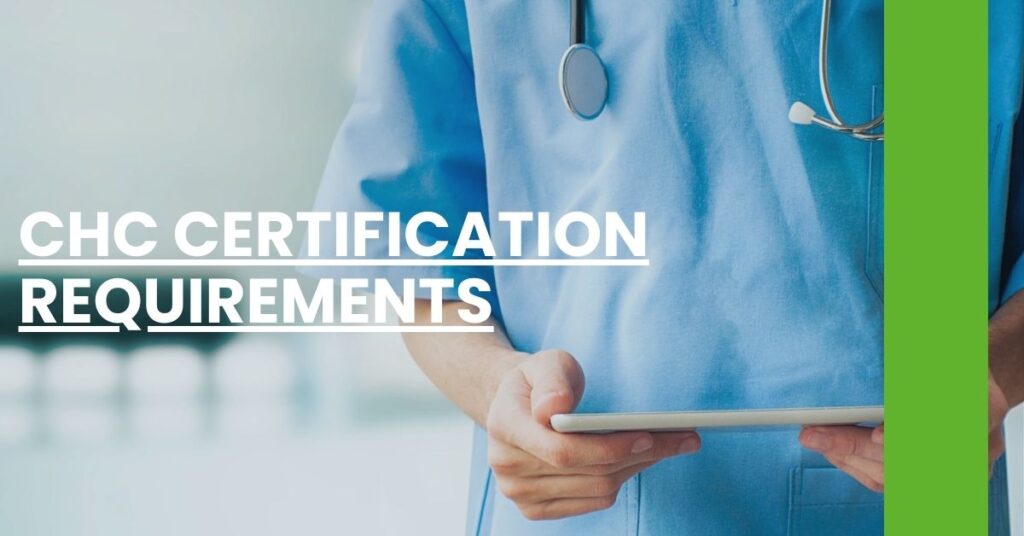CHC certification requirements are your stepping stone to a distinguished healthcare compliance career.
- Education and Experience: A blend of academic achievement and practical compliance work sets the foundation for CHC certification.
- Ethical Standards: Adherence to impeccable ethical norms is a must.
- Continuing Education: Ongoing learning is vital to uphold CHC credentials.
Embrace the journey to meet CHC certification requirements today.
- Understanding CHC Certification
- Eligibility Criteria for CHC Candidates
- CHC Examination: Core Components and Structure
- Preparing for the CHC Exam
- Application Process and Fee Structure
- Scheduling and Taking the Examination
- Maintaining CHC Certification: Continuing Education
- The Value of CHC Certification for Compliance Professionals
- Transitioning into a Healthcare Compliance Role with CHC
- How CHC Certification Shapes Healthcare Compliance
- Frequently Asked Questions About CHC Certification
- Conclusion: Taking the Next Steps Towards CHC Certification
Understanding CHC Certification
Healthcare compliance is a crucial part of the medical industry, ensuring that organizations adhere to laws, regulations, and standards to deliver safe and effective care. This is where the Certified in Healthcare Compliance (CHC) certification comes in – a recognition that sets the standard for integrity and competence in the field. Designed for current or aspiring healthcare compliance professionals, the CHC certification reflects a commitment to the necessary knowledge and ethical practices required in the healthcare compliance arena.
Earning a CHC certification is not just about fulfilling a series of checkboxes; it’s about demonstrating your dedication to the highest standards of compliance and understanding within healthcare. Whether you’re looking to enhance your professional credibility, increase your marketability, or simply ensure you’re equipped to handle the nuances of compliance, the CHC certification is a significant credential that can help propel your career forward.
Why CHC Certification Matters
A CHC certification signals to employers and peers that you possess a thorough understanding of the complex compliance landscape in healthcare, have been assessed against a set of rigorous criteria, and are committed to continuing education within the field. It lays the foundation for a career built on a deep understanding of compliance and positions you as a valued contributor to any healthcare organization.
Eligibility Criteria for CHC Candidates
When considering the CHC certification requirements, it’s paramount you understand the eligibility criteria. Here’s what you need to know:
- Education: A minimum level of education is required — typically a high school diploma or equivalent. However, a higher degree can provide an edge and potentially reduce the amount of required work experience.
- Experience: You’ll need a certain amount of work experience within the healthcare compliance field. Concrete experience helps ensure that candidates possess real-world insights into compliance issues.
Work Experience and Education Interplay
Depending on your educational qualifications, the required amount of work experience can vary. A bachelor’s degree, for instance, can sometimes reduce the experience requirement, allowing for a faster path to eligibility.
CHC Examination: Core Components and Structure
The CHC exam is meticulously designed to gauge your comprehensive understanding of healthcare compliance. It involves an extensive range of questions that not only tests your knowledge but also your ability to apply it in practical scenarios.
Exam Blueprint
- Content Coverage: The exam spans across varied subjects, including compliance regulations, risk management, and ethical standards—all central to a compliance professional’s role.
- Number of Questions: The CHC exam consists of a set number of multiple-choice questions, designed to assess your critical thinking and problem-solving skills within a timed environment.
Understanding the structure is a stepping stone to your success. Ensure you’re well-acquainted with the CHC exam’s blueprint to tailor your preparation effectively.
Preparing for the CHC Exam
Thorough preparation for the CHC exam can make a significant difference in your performance. Consider the following resources to optimize your study plan:
- Study Guides: There are comprehensive study guides available that align with the content of the CHC exam. These guides are instrumental in structuring your studies.
- Training Courses: Enroll in training courses that offer structured learning and insights into the intricacies of healthcare compliance.
Handy Tips for Effective Study
- Start Early: Begin studying well in advance of the exam date to ensure ample time for review.
- Practice Tests: Utilize practice tests to familiarize yourself with the exam format and identify areas for improvement.
Leverage resources like the CHC Exam Review Course and assess yourself regularly to stand the best chance of success.
Application Process and Fee Structure
Embarking on the application for the CHC exam is a decisive step in your certification journey. Here’s how you can navigate it:
- Application Submission: Ensure that you comprehensively fill out and submit the application form, meeting all necessary requirements.
- Fees: Be prepared to cover the application and exam fees, which vary depending on whether you are an HCCA member or not.
When considering the cost, remember, investing in a CHC certification can lead to long-term career returns. Comprehensive details about fees are available in the CHC handbook, so plan accordingly to accommodate this essential investment in your professional future.
Scheduling and Taking the Examination
Once your application for the CHC exam is approved, you’ll receive instructions on how to schedule your exam. This process allows you to select a date, time, and test center that’s convenient for you.
On the Examination Day
On the day of your CHC exam, it’s crucial to arrive well-prepared and on time. Make sure to bring all required identification and materials, as specified by the exam guidelines. You can expect a controlled test-taking environment designed to provide a fair opportunity for all candidates to showcase their knowledge.
By understanding and preparing for all aspects of the CHC certification requirements and exam process, you’re setting yourself up to not only successfully achieve the certification but also to excel in the ever-evolving world of healthcare compliance.
Maintaining CHC Certification: Continuing Education
Your commitment to the healthcare compliance profession doesn’t end upon receiving your CHC certification; it evolves. Continuing education is not only a requirement but also an opportunity for personal and professional growth within the healthcare compliance sector.
The Ins and Outs of Continuing Education Units (CEUs)
- Current Knowledge: Engaging in CEUs keeps you abreast of the latest regulations and industry best practices.
- Periodic Renewal: Maintain your CHC status by obtaining CEUs regularly. As per the Compliance Certification Board, you need to accrue a specific number of credits within a given time frame to keep your certification valid.
How to Earn Your CEUs
- Attend Workshops and Seminars: These can be conducted by relevant healthcare organizations or compliance associations.
- Participate in Webinars and Online Courses: Take advantage of digital platforms offering continuing education opportunities.
Remember, the continuing education activities should be relevant to healthcare compliance and approved by the accrediting body to count towards your credit requirement.
The Value of CHC Certification for Compliance Professionals
Holding the CHC certification doesn’t just set you apart in the job market; it assures healthcare organizations of your expertise and commitment to ethical standards. Deepening professional trust is essential in a field where regulations are stringent, and the cost of non-compliance is high.
Career and Organizational Benefits of CHC
- Enhanced Career Prospects: CHC certification can open doors to advanced career opportunities and higher salaries.
- Recognition of Expertise: Your certified knowledge is proof of your dedication to the healthcare compliance field.
- Boosted Organizational Standards: Implement better compliance practices within your organization, thereby reducing risk and improving patient care.
A CHC certification isn’t just a professional milestone – it’s a continuous journey of refining your skills and staying dynamic in a fast-paced sector.
Transitioning into a Healthcare Compliance Role with CHC
Your CHC certification is a passport to embarking on or enhancing your journey in the healthcare compliance field. Whether pivoting from another career or climbing the compliance career ladder, the CHC certification positions you as a desirable candidate.
Leveraging CHC in Your Career
- Networking Opportunities: Access to a community of compliance professionals and industry leaders.
- Skill Enhancement: Practical compliance knowledge and ethical decision-making skills at the forefront.
- Job Market Readiness: With CHC certification, you are acknowledged as being thoroughly vetted and validated in compliance competency.
Consider the CHC certification as an investment not only in your professional development but also in the health and welfare of the community you serve. It’s an endorsement of your ability to navigate the complex compliance landscape with confidence and integrity.
How CHC Certification Shapes Healthcare Compliance
The ripple effects of each CHC certified professional contribute significantly to the transformation of healthcare compliance. As regulations become tighter and compliance becomes more intricate, the demand for certified professionals is expected to rise.
Trends and Changes Influenced by CHC Professionals
- Policy Development: Your expertise contributes to developing sustainable compliance policies.
- Compliance Culture: Encourage a culture of integrity and accountability within healthcare organizations.
Consequently, a CHC certification isn’t just about individual achievement; it’s about contributing positively to the ethos of the healthcare sector at large. It’s about being part of a collective force driving towards better healthcare delivery through robust compliance practices.
Frequently Asked Questions About CHC Certification
Seeking CHC certification invariably comes with questions. Here are answers to some of the most commonly asked ones:
- Can I become certified if I’m new to the healthcare compliance field? Yes, provided you meet the eligibility criteria of education and experience.
- How often do I need to renew my CHC certification? Renewal typically occurs every two years, with ongoing education requirements.
- What’s the best way to prepare for the CHC exam? Utilize the plethora of available resources, including study guides and official training courses.
If your question hasn’t been covered, additional answers and guidance can be found by exploring the rich resources at the Health Care Compliance Association’s FAQ section.
Conclusion: Taking the Next Steps Towards CHC Certification
Embarking on the journey to achieving your CHC certification is a clear sign of your commitment to excellence in healthcare compliance. The chc certification requirements are designed to prepare you for a successful career in this vital industry. Remember, with each study session, networking event, and continuing education course, you’re fortifying your career and enhancing the quality of healthcare delivery. Your dedication today is the cornerstone of your professional impact tomorrow.
So take these insights, prepare thoroughly, and step confidently toward your goal of becoming a Certified in Healthcare Compliance (CHC) professional – your future in healthcare compliance looks bright!

